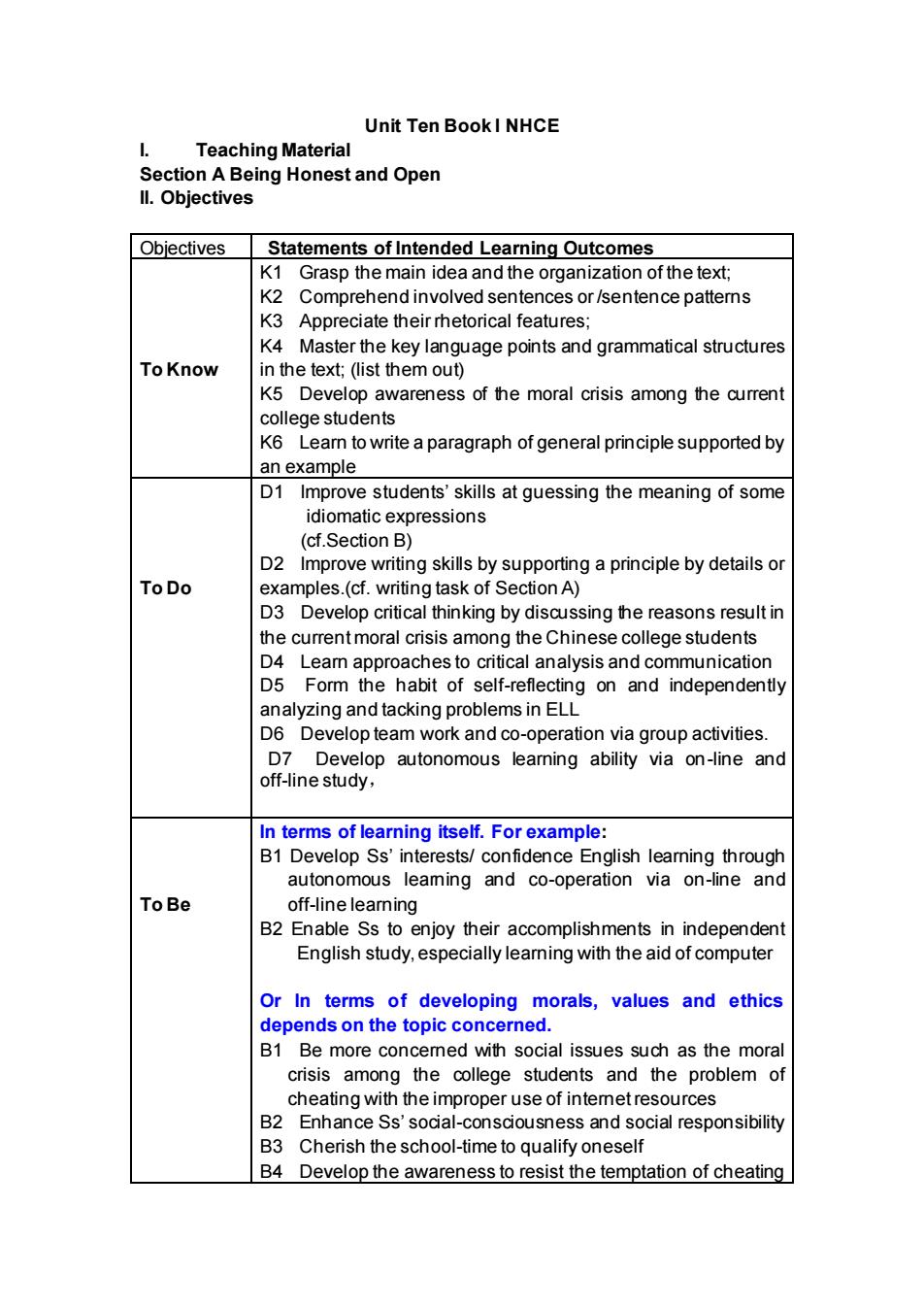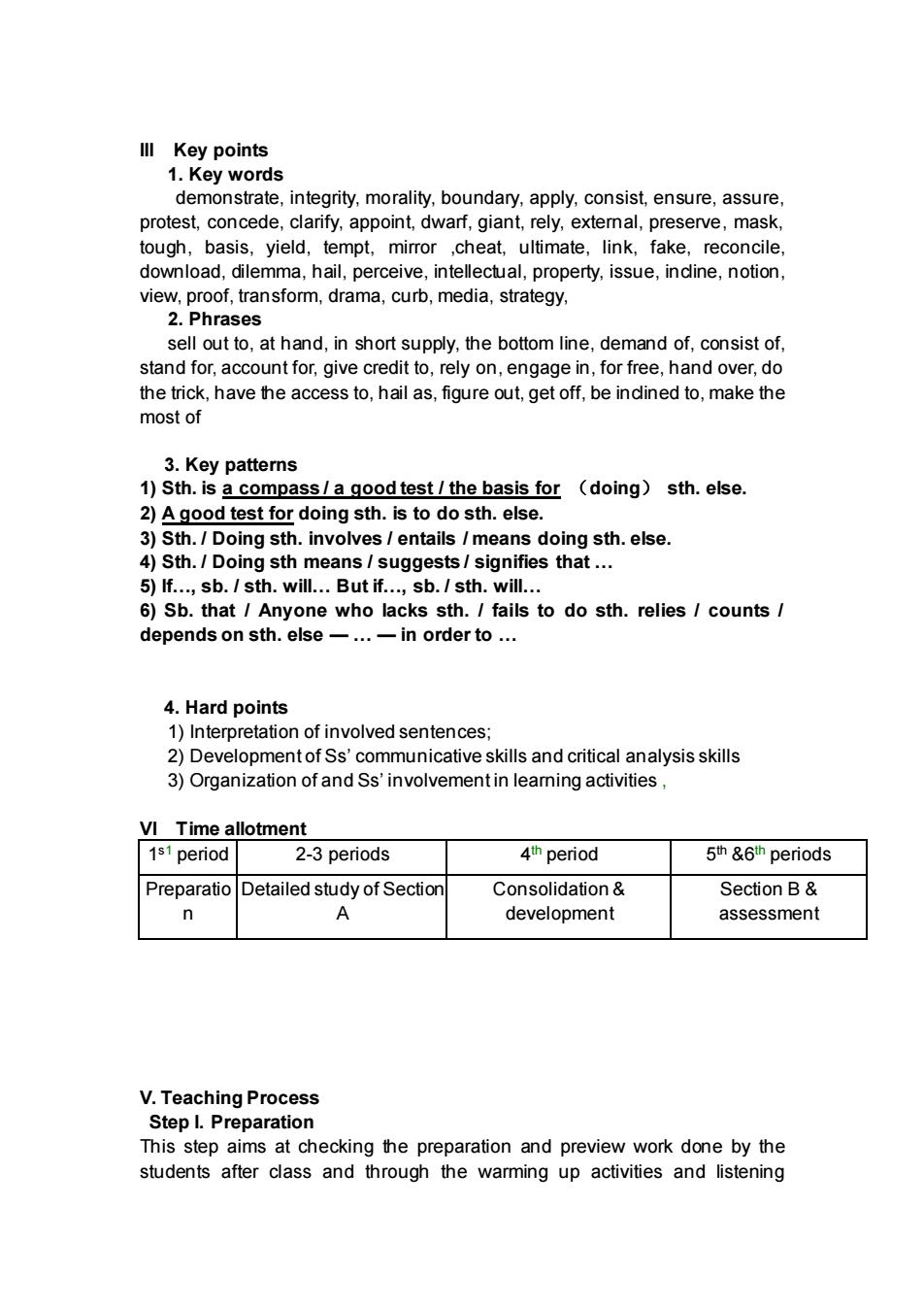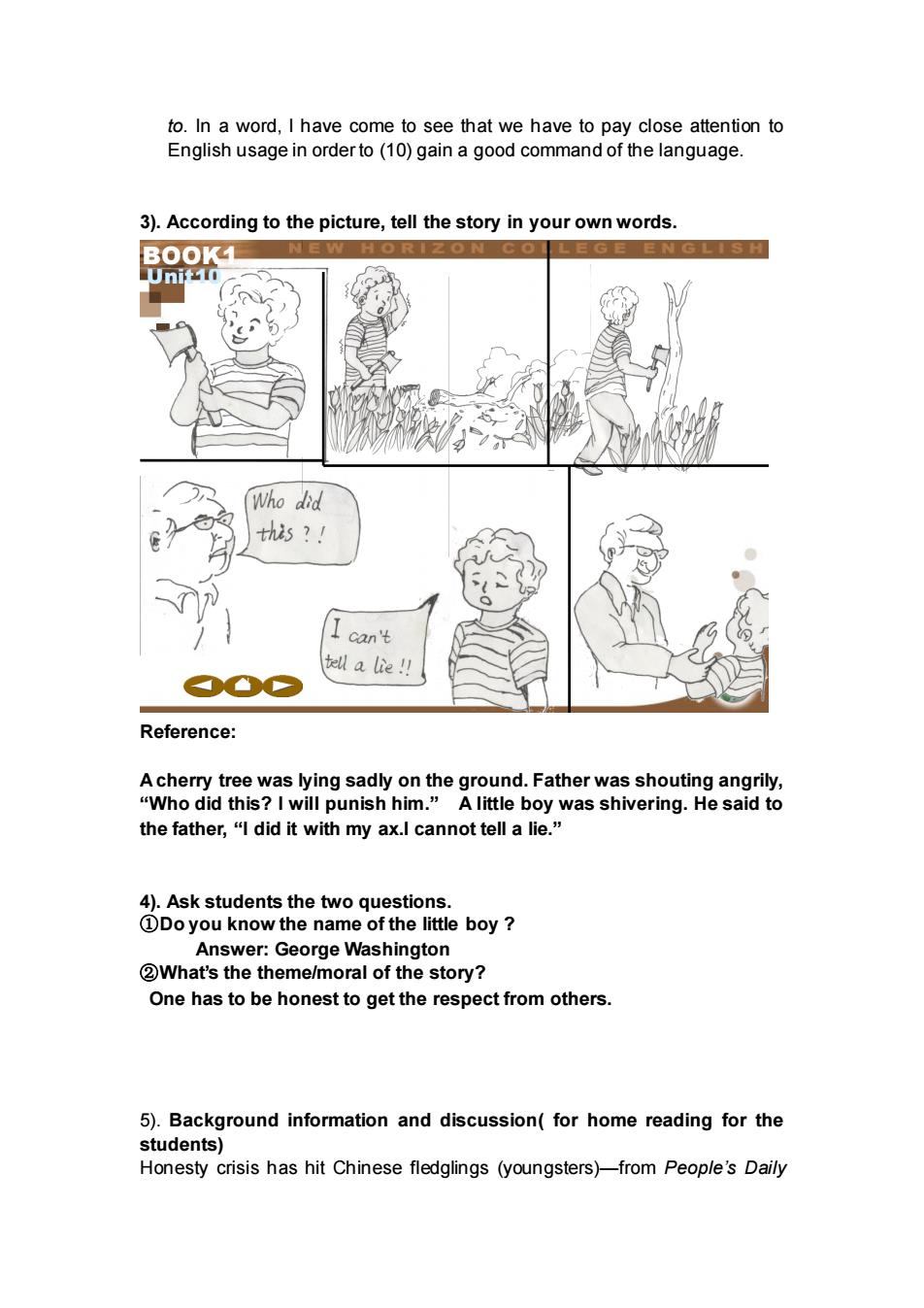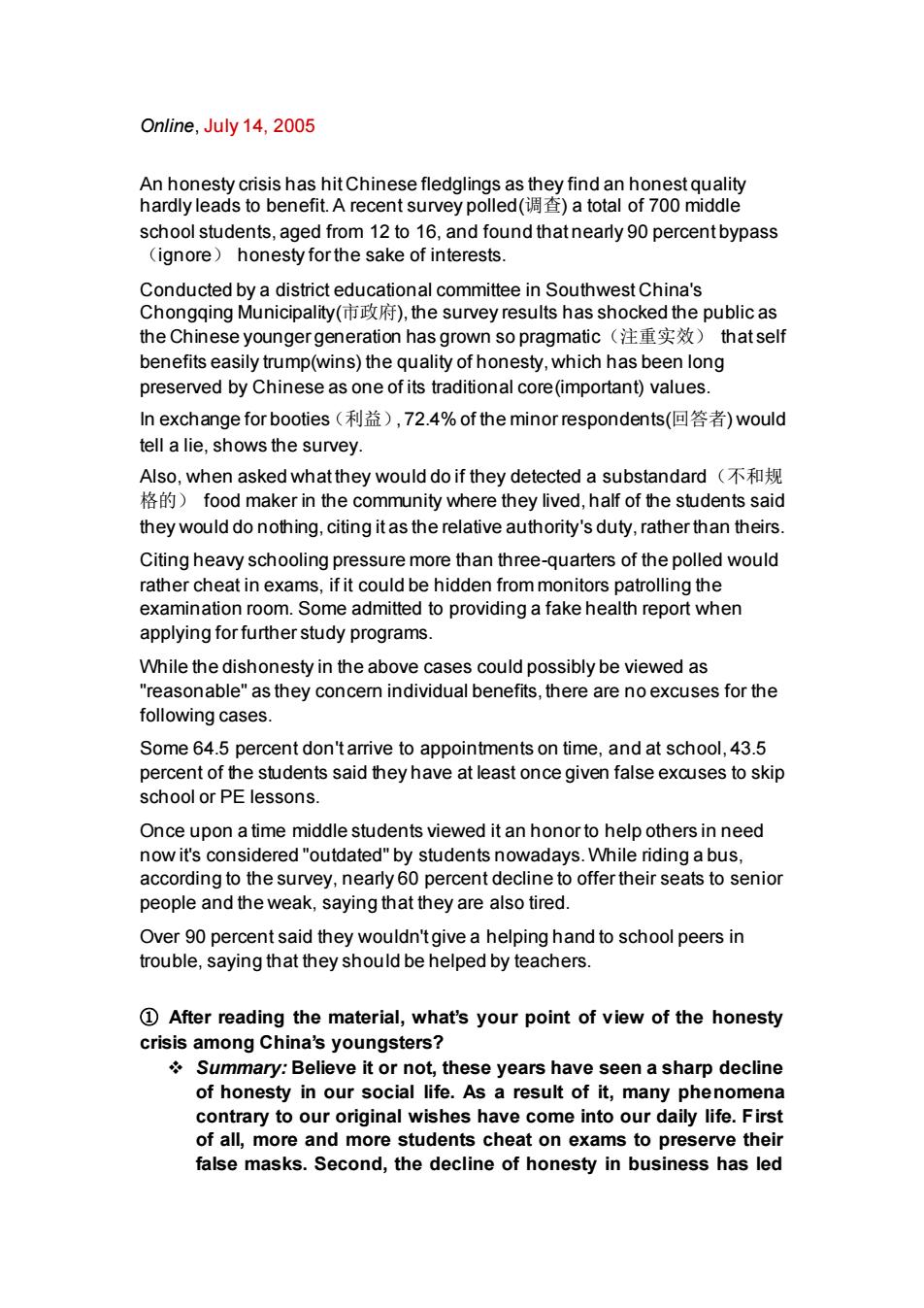
Unit Ten BookI NHCE Teaching Material Section A Being Honest and Open ll.Objectives Objectives Statements of Intended Learning Outcomes rasp he d the organiza tion of the text; K2 Compr hend involved sentences or/sentence pattems K3 Appreciate their rhetorical features; K4 Master the key language points and grammatical structures To Know in the text:(list them out) K5 Develop awareness of the moral crisis among the curren ege students K6 Learn to write a paragraph of general principle supported by an example d1 Improve students'skills at quessina the meanina of some pressions ection B) D2 Improve writing skills by supporting a principle by details or To Do examples.(cf.writing task of Section A) D3 Develop critical thinking by discussing the reasons result in the currentmoral crisis among the Chinese college students Leam ap ritical analysis and c nmun ation D5 Form the habit of self-reflecting on and independently analyzing and tacking problems in ELL D6 Develop team work and co-operation via group activities. D7 Develop autonomous leaming ability via on-line and off-line study, In terms of learning itself.For example: B1 Develop Ss'interests/confidence English leaming through autonomous leaming and co-operation via on-line and ToBe off-line leamning Enable ss to njy their accomplishments in independen English study,especially learning with the aid of computer Or In terms of developing morals,values and ethics depends on the topic concerned. 81 Be more conc emed with social issues such as the mora crisis among the college students and the problem of cheating with the improper use of intemet resources B2 Enhance Ss'social-consciousness and social responsibility B3 Cherish the school-time to qualify oneself De evelop the awareness to resist the temptation of cheating
Unit Ten Book I NHCE I. Teaching Material Section A Being Honest and Open II. Objectives Objectives Statements of Intended Learning Outcomes To Know K1 Grasp the main idea and the organization of the text; K2 Comprehend involved sentences or /sentence patterns K3 Appreciate their rhetorical features; K4 Master the key language points and grammatical structures in the text; (list them out) K5 Develop awareness of the moral crisis among the current college students K6 Learn to write a paragraph of general principle supported by an example To Do D1 Improve students’ skills at guessing the meaning of some idiomatic expressions (cf.Section B) D2 Improve writing skills by supporting a principle by details or examples.(cf. writing task of Section A) D3 Develop critical thinking by discussing the reasons result in the current moral crisis among the Chinese college students D4 Learn approaches to critical analysis and communication D5 Form the habit of self-reflecting on and independently analyzing and tacking problems in ELL D6 Develop team work and co-operation via group activities. D7 Develop autonomous learning ability via on-line and off-line study, To Be In terms of learning itself. For example: B1 Develop Ss’ interests/ confidence English learning through autonomous learning and co-operation via on-line and off-line learning B2 Enable Ss to enjoy their accomplishments in independent English study, especially learning with the aid of computer Or In terms of developing morals, values and ethics depends on the topic concerned. B1 Be more concerned with social issues such as the moral crisis among the college students and the problem of cheating with the improper use of internet resources B2 Enhance Ss’ social-consciousness and social responsibility B3 Cherish the school-time to qualify oneself B4 Develop the awareness to resist the temptation of cheating

Ill Key points 1.Key words demonstrate,integrity,morality,boundary,apply,consist,ensure,assure protest,concede,clarify,appoint,dwarf,giant,rely,extemnal,preserve,mask, tough,basis,yield,tempt,mirror ,cheat,ultimate,link,fake,reconcile. dowmioadaie ma,hail,perceive,intellectual,property,issue indine,notion view,proof,transform,drama,curb,media,strategy, 2.Phrases sell out to,at hand,in short supply,the bottom line,demand of,consist of, stand for,account for,give credit to,rely on,engage in,for free,hand over,do the trick,have the access to,hail as,figure out,get off,be incined to,make the most of 3.Key patterns 1)Sth.is a compass/a goodtest/the basis for (doing)sth.else. 2)A good test for doing sth.is to do sth.else. I Doi ing sth. involves/entals /means doing sth. oing sth ns/suggests/signifies that. 5)lf.,sb.sth.will.But if.,sb.sth.will. 6)Sb.that Anyone who lacks sth.fails to do sth.relies counts depends on sth.else-.-in order to. 4.Hard points 1)Interpretation of involved sentences; 2)Development of Ss'communicative skills and critical analysis skills 3)Organization of and Ss'involvement in leaming activities VI Time allotment 1s1 period 2-3 periods 4th period 5th&6th periods Preparatio Detailed study of Section Consolidation Section B& A development assessment V.Teaching Process Step I.Preparation This step aims at checking the preparation and preview work done by the students after class and through the warming up activities and listening
III Key points 1. Key words demonstrate, integrity, morality, boundary, apply, consist, ensure, assure, protest, concede, clarify, appoint, dwarf, giant, rely, external, preserve, mask, tough, basis, yield, tempt, mirror ,cheat, ultimate, link, fake, reconcile, download, dilemma, hail, perceive, intellectual, property, issue, incline, notion, view, proof, transform, drama, curb, media, strategy, 2. Phrases sell out to, at hand, in short supply, the bottom line, demand of, consist of, stand for, account for, give credit to, rely on, engage in, for free, hand over, do the trick, have the access to, hail as, figure out, get off, be inclined to, make the most of 3. Key patterns 1) Sth. is a compass / a good test / the basis for (doing) sth. else. 2) A good test for doing sth. is to do sth. else. 3) Sth. / Doing sth. involves / entails / means doing sth. else. 4) Sth. / Doing sth means / suggests / signifies that . 5) If., sb. / sth. will. But if., sb. / sth. will. 6) Sb. that / Anyone who lacks sth. / fails to do sth. relies / counts / depends on sth. else — . — in order to . 4. Hard points 1) Interpretation of involved sentences; 2) Development of Ss’ communicative skills and critical analysis skills 3) Organization of and Ss’ involvement in learning activities , VI Time allotment 1 s1 period 2-3 periods 4 th period 5 th &6th periods Preparatio n Detailed study of Section A Consolidation & development Section B & assessment V. Teaching Process Step I. Preparation This step aims at checking the preparation and preview work done by the students after class and through the warming up activities and listening

comprehension to enable the students have a general idea aboutthe key points of the texts and to stimulate their interests in joining the study and activities in the class 1).Listen to the following new words of Unit 10 Section Aand try to make sentences with these new words in your own words,you have to remember that your sentences have to be grammatically c Demons e,apply co ensu assure,protest,concede,clarify, rely,yield,tempt,stand for,account fo 2).Dictation. Directions:In this section,you will hear a short passage which is displayed herein below with some words missing.The passage will be read three times. leJeue6 ea6obulpeeJ puooas lnn o the passage fron h nning to the d to words in the corresponding blanks during the pauses which may begin with a signal.Then you check what you have got in the third reading. ugh nt all i had to atto express onesideas in E to(1) new wasjust(2 _putting words together according to the rules of grammar.When I was(3)_ to say "I see many books on the(4)_ and“I am going to see the doctor” I thought Ihad leamed everything about the word see,Idid not(5)_until later that we do not say "see a book or newspaper"but"read a book or news paper"when we mean "look atand understand something(6)or printed" I became more interested in English and since then Ihave been trying to watch outfor(7) ways of saying things.I have now leamed to say “join a club"but (8) a discussion"."make a model plane"but"do one's homework".I have also leamed the between after and since.between hear and sten to.In a word.I have come to see that we have to pa to Enalish usage in order to (10) of the language Answer: When I began leaming English,I thought all I had to do was to(1)memorize new words.It seemed to me that to express one's ideas in English was f p ng word togethe the ru “I see many boo ules of gramma s on the(4)shelt and Tar going to see the doctor",I thought I had learned everything about the word see,I did not(5)realize until later that we do not say “see a book or newspaper'”but“read a book or news paper'”when we mean“look at and understand something(6)written or printed".Ibecame more interested in English and since then I have been trying to watch out fo ways of saying things.I have now leamed to say "join a club"but"(8)join in a discussion","make a model plane"but"do one 's homework".I have also learned the (9)difference between after and since.between hearand listen
comprehension to enable the students have a general idea about the key points of the texts and to stimulate their interests in joining the study and activities in the class. 1). Listen to the following new words of Unit 10 Section A and try to make sentences with these new words in your own words, you have to remember that your sentences have to be grammatically correct. Demonstrate, apply, consist, ensure, assure, protest, concede, clarify, rely, yield, tempt, stand for, account for 2). Dictation. Directions: In this section, you will hear a short passage which is displayed herein below with some words missing. The passage will be read three times. You will listen to the passage from the beginning to the end to get a general idea in the first reading. In the second reading, you start to type the missing words in the corresponding blanks during the pauses which may begin with a signal. Then you check what you have got in the third reading. When I began learning English, I thought all I had to do was to (1)_new words. It seemed to me that to express one’s ideas in English was just(2)_ _ _ putting words together according to the rules of grammar. When I was (3)_ to say “I see many books on the (4) _”and “I am going to see the doctor”, I thought I had learned everything about the word see, I did not(5)_until later that we do not say “see a book or newspaper” but “read a book or news paper” when we mean “look at and understand something (6)_ or printed”. I became more interested in English and since then I have been trying to watch out for(7)_ ways of saying things. I have now learned to say “join a club” but “(8)_ _ a discussion”, “make a model plane” but “do one’s homework”. I have also learned the (9)_ between after and since, between hear and listen to. In a word, I have come to see that we have to pay close attention to English usage in order to (10)_ _ _ _ of the language. Answer: When I began learning English, I thought all I had to do was to (1)memorize new words. It seemed to me that to express one’s ideas in English was just(2) a matter of putting words together according to the rules of grammar. When I was (3)taught to say “I see many books on the (4) shelf” and “I am going to see the doctor”, I thought I had learned everything about the word see, I did not(5)realize until later that we do not say “see a book or newspaper” but “read a book or news paper” when we mean “look at and understand something (6)written or printed”. I became more interested in English and since then I have been trying to watch out for(7)idiomatic ways of saying things. I have now learned to say “join a club” but “(8) join in a discussion”, “make a model plane” but “do one’s homework”. I have also learned the (9)difference between after and since, between hear and listen

to.In a word,I have come to see that we have to pay close attention to English usage in orderto(10)gain a good command of the language 3).According to the picture,tell the story in your own words. BOOK1 n Who did h5?1 I can't tell a lie!! O Reference: A.cherrydly on the ground.Fatherwas shouting angriM "Who hinm. ttl boy was shivering.He said o the father,"I did it with my ax.I cannot tell a lie.' 4).Ask students the two questions Do you know the name of the little boy Answer:George Washi 2What's the theme/moral of the story? One has to be honest to get the respect from others. 5).Background information and discussion(for home reading for the students) Honesty crisis has hit Chinese fledglings (youngsters)-from People's Daily
to. In a word, I have come to see that we have to pay close attention to English usage in order to (10) gain a good command of the language. 3). According to the picture, tell the story in your own words. BOOK1 Unit10 Reference: A cherry tree was lying sadly on the ground. Father was shouting angrily, “Who did this? I will punish him.” A little boy was shivering. He said to the father, “I did it with my ax.I cannot tell a lie.” 4). Ask students the two questions. ①Do you know the name of the little boy ? Answer: George Washington ②What’s the theme/moral of the story? One has to be honest to get the respect from others. 5). Background information and discussion( for home reading for the students) Honesty crisis has hit Chinese fledglings (youngsters)—from People’s Daily

Online,July 14,2005 rvey po school students,aged from 12 to 16,and found thatnearly 90 percent bypass (ignore)honesty forthe sake of interests. Conducted by a district educational committee in Southwest China's Chongqing Municipality(市政府),the survey results has shocked the public as the Chinese younger generation has grown so pragmatic(注重实效)thatself benefits easily trump(wins)the quality of honesty,which has be n long preserved by Chinese as one of its traditional core(important)values. In exchange for booties(利益),72.4%of the minor respondents(回答者)would tell a lie,shows the survey. Also,when asked what they would do if they detected a substandard(不和规 food maker in the community where they lived,half of the students said they would do nothing.citing itas the relative authority's duty.rather than theirs Citing heavy schooling pressure more than three-quarters of the polled would rather che eat in exams,if it could be hidden from monitors p examination room.Some admitted to providing a fake health report when applying for further study programs. While the dishonesty in the above cases could possibly be viewed as "reasonable"as they concem individual benefits.there are no excuses for the following cases. Some 64.5 percent don'tarrive to a appointments on time,and at school,43.5 percent of the students said they have at least once given false excuses to skip school or PE lessons. Once upon a time middle students viewed it an honor to help others in need now it's considered"outdated"by students nowadays.While riding a bus, according to the survey,nearly 60 percent decline to offer their seats to senior people and the weak,saying that they are also tired. Over 90 percent said they wouldn'tgive a helping hand to school peers in trouble saying that they should be helped by teachers DAfter reading the material,what's your point of view of the honesty crisis among China's youngsters? Summary:Believe it or not,these years have seen a sharp decline of honesty in our social life.As a result of it,many phenomena origi a come into our daily life. of all.more and more students cheat on exams to preserve the false masks.Second,the decline of honesty in business has led
Online, July 14, 2005 An honesty crisis has hit Chinese fledglings as they find an honest quality hardly leads to benefit. A recent survey polled(调查) a total of 700 middle school students, aged from 12 to 16, and found that nearly 90 percent bypass (ignore) honesty for the sake of interests. Conducted by a district educational committee in Southwest China's Chongqing Municipality(市政府), the survey results has shocked the public as the Chinese younger generation has grown so pragmatic(注重实效) that self benefits easily trump(wins) the quality of honesty, which has been long preserved by Chinese as one of its traditional core(important) values. In exchange for booties(利益), 72.4% of the minor respondents(回答者) would tell a lie, shows the survey. Also, when asked what they would do if they detected a substandard(不和规 格的) food maker in the community where they lived, half of the students said they would do nothing, citing it as the relative authority's duty, rather than theirs. Citing heavy schooling pressure more than three-quarters of the polled would rather cheat in exams, if it could be hidden from monitors patrolling the examination room. Some admitted to providing a fake health report when applying for further study programs. While the dishonesty in the above cases could possibly be viewed as "reasonable" as they concern individual benefits, there are no excuses for the following cases. Some 64.5 percent don't arrive to appointments on time, and at school, 43.5 percent of the students said they have at least once given false excuses to skip school or PE lessons. Once upon a time middle students viewed it an honor to help others in need now it's considered "outdated" by students nowadays. While riding a bus, according to the survey, nearly 60 percent decline to offer their seats to senior people and the weak, saying that they are also tired. Over 90 percent said they wouldn't give a helping hand to school peers in trouble, saying that they should be helped by teachers. ① After reading the material, what’s your point of view of the honesty crisis among China’s youngsters? ❖ Summary: Believe it or not, these years have seen a sharp decline of honesty in our social life. As a result of it, many phenomena contrary to our original wishes have come into our daily life. First of all, more and more students cheat on exams to preserve their false masks. Second, the decline of honesty in business has led